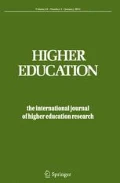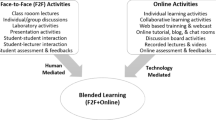Abstract
Concern is often expressed about the underrepresentation of women in scientific and technological programmes in higher education. This concern prompted us to undertake a study of Australian computing science courses at the top level of professional accreditation. Our concern was with the numbers of women enrolling and how women fared in the early stages of the courses. The work from our study provides the basis for this paper in which we examine the ways in which women tend to be disadvantaged in computing courses. We discuss the issues both in terms of factors which are identifiable from the perspective of the discipline at large and those which are associated specifically with the presentation of courses within institutions of higher education. At the discipline level we discuss the apparent technology-centredness of computing, the emphasis accorded mathematics as well as narrow problem solving skills and the undervaluing of broadly based problem solving and communication skills. In the institutional context, our concerns lie with the consequences of gender stereotyping on attitudes and interactions, the significance of prior computing knowledge and experience as well as of mathematical background, and the way the curriculum is structured and organised.
Similar content being viewed by others
References
Ausubel, D.P., Novak, J.S., and Hanesian, H. (1978), Educational Psychology: A Cognitive View (2nd ed.), Holt, Rinehart and Winston, New York.
Bakon, C., Nielsen A., and McKenzie, J. (1983), “Computer fear”, Educational Leadership 41, p.27.
Barnes, M., Plaister, R., and Thomas, A. (1984), Girls Count in Maths and Science. Canberra; Commonwealth Schools Commission, Australia.
Barron, D.W., Crawford, R.F., Farrow, P.F., Garratt, P.W., and Hall, W. (1985), “Women and the micro”, Department of Computer Science, Southampton University.
Beswick, D. and Boreham, J. (1983), “Development of Scientific Interests and Competence,” Paper presented at 53rd ANZAAS Congress, Perth.
Erickson, G. and Erickson, L. (1984), “Females and science achievement: evidence, explanations and implications”, Science Education 68(2): 63–69.
Fennema, E. (1981), “Girls, women and mathematics”, R. Kennedy (ed), Girls, Mathematics and Employment. Social Development Unit of the Minister for Education in NSW, Australia.
Game, A. and Pringle, R. (1983), Gender at Work. Allen and Unwin, Sydney, Australia.
Gerver, E. and Lewis, L. (1984), “Women, computers and adult education: liberation or oppression?”, Convergence 17(4): 5–16.
Gill, J; (1984), “Hanging Rock revisited: the not so mysterious disappearance of girls along certain educational paths”, in Burns, R. and Sheehan, B. (eds), Women in Education. Proceedings of the Twelfth Annual Conference of the Australian and New Zealand Comparative and International Education Society, pp. 151–163.
Gribbin, M. (1984), “Boys muscle in on the keyboard”, New Scientist, August 20, pp. 16–17.
Harding, J. (1980), “Sex differentiation and schooling”, Education in Science, September, p. 27.
Harding, J. (1983), Switched Off: The Science Education of Girls. Longman, for Schools Council. 57 pp.
Head, J. (1979), “Personality and the pursuit of science”, Studies in Science Education 6: 13–44.
Head, J. (1980), “A model to link personality characteristics to a preference for science”, European Jounal of Science Education 2(3): 295–300.
Horace. In Douglas, C. (Compiler) (1937), Forty Thousand Quotations: Prose and Poetical. Haleyon House, New York.
Johnston, L.J. (1984), “Survey of attitudes to studies and careers in computer science and mathematics”, Unpublished paper. Department of Computer Science, The University of Melbourne, Australia.
Kay, J. and Prosser, M. (1983), A Formative Study of the First Programming Module of Computer Science. Technical Report 221. Basser Department of Computer Science, The University of Sydney, Australia.
Kay, J. and Prosser, M. (1984), “Making a good start: a study of students entering a first year computer science course”, in Hughes, J. (ed), Computers and Education: Dreams and Reality. Second Australian Computer Education Conference, pp. 22–24.
Kay, J., Collings, P., Lublin, J., Poiner, G., Prosser, M., Bishop, R., and Watson, K. (1986), Investigation of the Women at Early Stages of Professionally Accredited Tertiary Computer Science and Data Processing Programmes. Report to Evaluations and Investigations Programme, Commonwealth Tertiary Education Commission.
Konvalina, J., Stephens, L., and Wileman, S. (1983), “Identifying factors influencing computer science aptitude and achievement”, AEDS Journal, Winter 1983: 106–112.
Leder, G. (1981), “Barriers to success in mathematics”, in R. Kennedy (ed), Girls, Mathematics and Employment. Social Development Unit of the Minister for Education in NSW, Australia.
Lockheed, M.E. and Frakt, S.B. (1984), “Sex equity: increasing girls' use of computers”, The Computing Teacher 11(8): 16–18.
Lockheed, M. (1985), “Women, girls, and computers: a first look at the evidence”, Sex Roles 13(3/4): 115–122.
Miura, I. and Hess, R. (1983), “Sex differences in computer access, interest and usage”, Paper presented at the 91st Annual Convention of the American Psychological Association at Anaheim, California.
Moont, S. (1984), “Computer literacy: an anthropological viewpoint”, in Hughes, J. (ed), Computers and Education; Dreams and Reality.Op. cit., Computers and Education: Dreams and Reality. Second Australian Computer Education Conference pp. 31–34.
Omerod, M.B. (1971), “The ‘Social Implications’ factor in attitudes to science”, British Journal of Educational Psychology 41, 335–338.
Papert, S. (1985), “Computer criticisms vs technocentric thinking”, Logo 85, 53–67.
Porter, A.L. and Pirie, I.G. (1986), “In the words of the students: a study of attrition in a first year tertiary computing course”, Conference Proceedings. National Computers Education Conference, Melbourne.
Powles, M. (1986), Women's Participation in Tertiary Education: A Review of Recent Australian Research. Commonwealth Tertiary Education Commission, Canberra, Australia.
Sanders, J.S. (1984), “The computer: male, female or androgynous?”, The Computing Teacher 11(8), 31–34.
Wilder, G., Mackie D., and Cooper, J. (1985), “Gender and Computers: two surveys of computer-related attitudes”, Sex Roles 13(3/4): 215–228.
Willis, S. and Kenway, J. (1985), Them That Has, Gets. Working Paper of the National Evaluation of the School's Commission School's Computing Program, Australia.
Author information
Authors and Affiliations
Rights and permissions
About this article
Cite this article
Kay, J., Lublin, J., Poiner, G. et al. Not even well begun: women in computing courses. High Educ 18, 511–527 (1989). https://doi.org/10.1007/BF00138745
Issue Date:
DOI: https://doi.org/10.1007/BF00138745



